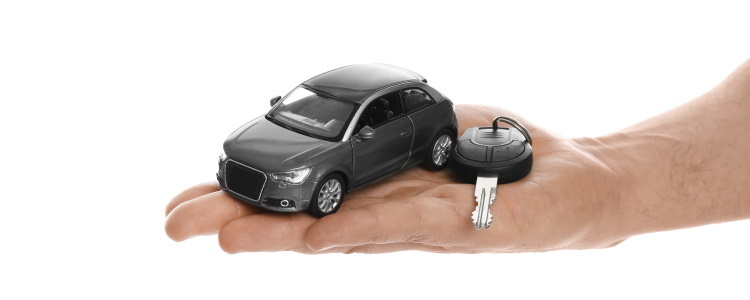Many bad credit borrowers are advised to get a cosigner to increase their chances of qualifying for an auto loan. However, having a cosigner doesn’t mean you have a 100% chance of getting approved.
Cosigners and Car Loans
When you bring a cosigner along for the ride, they provide more security for the loan. A cosigner promises to repay the loan if you can’t, so a lender is more likely to consider you for financing because there’s more than one person willing to repay it. Additionally, choosing a cosigner that has a good history of repaying loans can also increase your chances of qualifying.
However, depending on your credit score, the cosigner’s credit score, and all the other factors that go into vehicle financing, a cosigner may not be that much help.
A cosigner isn't a cure-all for every situation. They can “lend” you their good credit score to help you meet auto loan requirements, but if your credit reports have serious negative marks or you fall short in other areas, you could still be denied a car loan with a cosigner.
 Here are some situations where having a cosigner may still mean getting denied an auto loan:
Here are some situations where having a cosigner may still mean getting denied an auto loan:
- You have a dismissed bankruptcy on your credit reports
- You have a fresh car repossession (less than 12 months old) on your credit reports
- You don’t have enough available income to repay the loan
- Your cosigner has a poor credit score
- Your cosigner's credit score is lower than yours
- Your cosigner doesn’t have enough available income to repay the loan
Common Auto Loan Denial Reasons
It’s not always possible to qualify for an auto loan every time you apply for one, even with a cosigner. Your current personal situation, income, credit history, and even the vehicle you want to finance can all influence your chances of getting approved for a loan.
Two of the most common auto loan denial reasons are a lack of income and a poor credit score. Here are some ways to combat these and increase your chances of getting approved for vehicle financing after denial.
Co-borrowers and Income Requirements
If your problem is not having enough income, getting a co-borrower that has a more stable or higher income could help. To qualify for a car loan, you need to meet income requirements. A steady income is a key component of getting approved for vehicle financing. Many lenders also have work history stipulations that require you to be at your current job for at least six months to one year.
The specific income requirements vary depending on the type of lender you’re working with, and how much you're hoping to finance.
Generally, if you bring in a monthly gross income of around $1,500 to $2,500, you’re likely to meet the income requirements of many auto lenders if you’re aiming for a modest vehicle. Having stable work history helps, too.
Bad Credit Auto Loans Without a Cosigner
Your creditworthiness is defined as your ability to borrow money, and your credit score serves as a way for lenders to make a quick judgment about your past credit history. Borrowers with a credit score around or below 670 are generally considered bad credit borrowers.
With a credit score in this range, it can be tough to find a lender willing to work with you. Traditional auto lenders put a lot of stock on your credit reports and score. If your credit history isn’t quite up to snuff, it can mean getting denied for vehicle financing, even with a cosigner. In these cases, visiting a dealership that's prepared to work with bad credit borrowers may help.
What To Do if a Car Loan is Denied
When you're denied an auto loan due to either income or credit restrictions, your solution changes depending on the issue. There are plenty of options out there – get a co-borrower if you need more income, or visit a dealership that's well-versed in handling unique credit situations. Here are some suggestions to consider if you've been denied a car loan.
Consider a Joint Auto Loan
 The amount of available income you have matters when you're applying for an auto loan.
The amount of available income you have matters when you're applying for an auto loan.
Income is a major factor in auto loan eligibility. If your income doesn’t meet the requirements, a cosigner’s income isn’t added to yours – they’re considered separately. A cosigner doesn’t help you make the car payments each month, so your income is what’s used to determine your eligibility for the auto loan. One option is to consider cutting out some monthly expenses to lower your debt-to-income ratio. Or, if you need more available income to qualify for a car loan, then having a co-borrower may be what you need. If your income is tied up with other obligations or loans, or your monthly income doesn’t make the cut, consider a joint auto loan with a co-borrower.
Co-borrowers help you meet income requirements by adding their income to yours, and if approved, the loan is called a joint car loan. Most lenders prefer life partners and spouses as co-borrowers since you can prove that your resources are pooled together. Instead of just your name and the lender’s name listed on the vehicle title, the co-borrower’s name is listed, too. This means you both have obligations to the auto loan and get equal rights to the vehicle. Co-borrowers can often help borrowers get into larger loan amounts.
Consider Special Financing
There are lenders willing to assist borrowers with less-than-perfect credit. If you work with a special finance dealership that’s signed up with subprime lenders, your credit score is only one piece of the equation.
Subprime lenders look at your situation in terms of income, down payment amount, work history, living expenses, financial and residential stability, and other factors. Instead of just relying on your credit score to make an auto loan approval decision, a larger picture of your financial situation is considered.
Many subprime lenders have first-time buyer programs too since they can tell the difference between no credit and bad credit. They also assist borrowers whose credit score has dropped due to setbacks such as bankruptcy and repossession.
Cosigners and co-borrowers can certainly widen your auto loan opportunities, but they can’t help in every situation. For borrowers with severely damaged credit, or those who don’t have the luxury of having a cosigner in the first place, there are bad credit lending options to consider.
- Buy here pay here (BHPH) dealerships are known for skipping the credit check. Bad credit borrowers are typically asked to bring a cosigner because they have credit issues, so going with a dealer that may skip the credit pull could mean not needing a cosigner. However, you still need to meet income requirements and likely need a down payment.
- Subprime auto lenders are signed up with special finance dealerships. They specialize in assisting borrowers with unique credit challenges, including bankruptcy, situational bad credit, and no credit. Since a subprime lender considers more than just your credit score, a cosigner may not be required to qualify. There is still income, down payment, and residency requirements to meet.
Not Sure Why You Were Denied Auto Financing?
If you’re not entirely sure as to why you can’t get approved for an auto loan, ask the lender that denied your application. Lenders are required to let you know why they denied you, most often in the form of a letter. If you applied for vehicle financing with a direct lender, you may be able to ask them in person and discuss what your next options are.
Don’t be afraid to ask questions about how you can improve your chances of getting approved. Everyone’s situation is different, and some lenders don’t work with borrowers with unique credit situations. Many traditional auto lenders prefer borrowers with clean reports, and even with a good credit score, and there may be something in your credit reports that a lender can’t work around.
A good way to prepare yourself for a car loan is to check your credit reports and scores. You can request a free copy of your credit reports from www.annualcreditreport.com. This is a trusted government website, and you can request all three of your credit reports from Experian, TransUnion, and Equifax. These credit reporting agencies could report different information, so be sure to review all three to see what lenders are seeing when you apply for new credit.
Get Connected to a Dealer
Even when you’re prepared with sufficient income to pay for a vehicle, and you know what’s on your credit reports, bad credit can still get in the way of your next auto loan. If this is the case for you, it may be time to look for alternative lending options. Instead of looking for the right lender on your own, let Auto Credit Express handle it. We’ve created a nationwide network of special finance dealerships over the last 20 years. Complete our free auto loan request form, and we’ll look for a dealer in your local area that’s equipped to help with many unique credit circumstances.


















